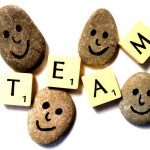 It goes without saying that teamwork and collaboration are key elements of what it means to be a social business. Of course, teamwork is not always the best form of working, as an article I wrote earlier this summer highlighted. Studies have suggested for instance, that ideation is often best done in isolation, with the collective then utilized in developing those ideas.
It goes without saying that teamwork and collaboration are key elements of what it means to be a social business. Of course, teamwork is not always the best form of working, as an article I wrote earlier this summer highlighted. Studies have suggested for instance, that ideation is often best done in isolation, with the collective then utilized in developing those ideas.
I’m going to assume for a minute though that you know the best time and place to engage your team rather than work independently of them, and focus this post on how you can best do that. A new study suggests that the key to successful team work is what they call ‘information elaboration’ discussions.
What are these? They are conversations whereby information is freely exchanged, ideas are shared and people feel confident in giving feedback on the perspectives of others, with the group then building this feedback into future behaviours. The researchers suggest this is the holy grail of team work, and will allow specialized, cross-functional teams to truly capitalize on the diverse skills and knowledge within the team.
Having the right ingredients
The team go on to suggest that the best collectives have a strong enough mindset to underpin this desire for information elaboration discussions. They reveal that getting team members aligned with this mindset quickly can allow the team to rapidly determine what information is relevant before then discussing the information in a detailed manner.
What’s more, they also recommend enrolling team members that are happy to take responsibility for leading the team and in collaborating the decision making process. Trust was also found to play a big part in the success of the team, and people with a high level of ‘self-reliance beliefs’ were more inclined to mistrust others, with a derailing of collective efforts often a result.
The researchers suggested that this kind of team dynamic is especially important in an environment that is in any way turbulent or unpredictable. The opposite is often the case when the environment involves more routine problems that take place in less disruptive settings. In this kind of environment the detailed communication explained above can do little but waste resources.
“Specialized cross-functional teams working in dynamic, fast-paced environments will perform better when they are staffed with members who not only have the right technical skillsets, but also have the ability and motivation to exchange information in a rich and detailed manner,” the researchers conclude. “In less disruptive environments, teams should focus more on the formation of routines and the adoption of accepted practices to gain decision-making efficiencies.”